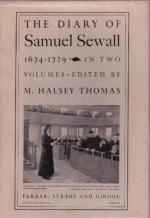|
This section contains 383 words (approx. 2 pages at 300 words per page) |
Encyclopedia of World Biography on Samuel Sewall
The voluminous diary of Samuel Sewall (1652-1730), American jurist, provides a vivid picture of the Boston of his day as well as of himself.
Samuel Sewall was born on March 28, 1652, in North Baddesley, Hampshire, England. His father was an occasional minister and cattle raiser who had spent from 1634 to 1646 in Massachusetts, where he had met his wife. After study at a grammar school, Samuel went to Newbury, Mass., where his father had returned two years earlier. Samuel's education continued under the local minister. In 1667 he entered Harvard; he graduated in 1671 and became master of arts in 1674. Unlike most of his classmates, he did not become a minister.
In 1676 Sewall married the daughter of a prosperous merchant. The story that his wife's dowry was her weight in the pine-tree shillings her father minted may not be apocryphal. Sewall went to work for his father-in-law. He became a constable in 1679, and in 1681 he was appointed to the Massachusetts General Court. His wife's inheritance after her father's death in 1683 was substantial, and it permitted Sewall to shift from business to civic service.
Sewall's diary records his daily life, with few opinions and no introspection. He was mainly conservative, conventionally religious, worldly but charitable, a Puritan and a Yankee. His diary indirectly reveals contemporary attitudes. It covers a business trip he made to England in 1688-1689. It is less detailed than one might wish on the Salem witch trials of 1692, when he served as one of seven judges. Eventually he saw the evil of which he had been guilty by his condemnation of "witches," and in 1697 he publicly acknowledged his error.
Following the witch trials, Sewall was appointed a judge of the Superior Court of Massachusetts, a post he held for twenty-five years. Then for eleven years he was chief justice. He was devoted to the cause of Christianizing Native Americans and freeing slaves. To the latter cause he devoted a pamphlet, The Selling of Joseph (1700). Another pamphlet, Phaenomena quadem Apocalyptica ad aspectum Novi Orbis configurata (1687), argued that New England was a suitable site for the new Jerusalem.
Sewall's wife died in 1717. Of their fourteen children, only five survived her. Sewall married two more times. One failed courtship attempt is described in one of the diary's most attractive episodes. Sewall died in Boston on Jan. 1, 1730.
|
This section contains 383 words (approx. 2 pages at 300 words per page) |


